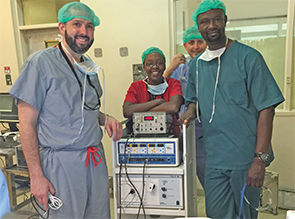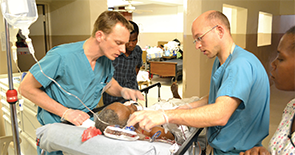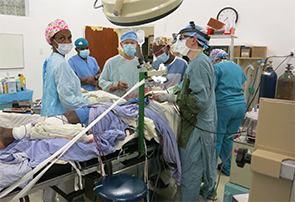
From left: Matthew Bush, MD, Catherine Irungu, MD, John Ayugi, MMED, Paul Radabaugh, MD. This donated facial nerve monitor was the first of its kind at the University of Nairobi.
Courtesy of Matthew Bush, MD
Telling a patient that he needs a full laryngectomy can be tough for any physician. But if the patient and the physician don’t speak the same language, don’t even hail from the same country—let alone the same continent—and the physician is working with limited or nonexistent resources, the conversation can be baffling.
“When you are 3,000 miles away from a monitor, you are doing complex surgery, you have nurses who have never seen what you are doing, and you are making decisions and you are only there for a week, it’s challenging,” said Adam Luginbuhl, MD, an assistant professor of head and neck surgical oncology at Thomas Jefferson University in Philadelphia.
Dr. Luginbuhl tried to explain to his patient’s family that their loved one needed a laryngectomy due to cancer. “We examined the gentleman in the clinic at 8:00 a.m. and proposed to do the surgery later that afternoon,” he said. “I’m working with translators to explain, again and again, that if I don’t do this, the patient will die in the next couple of months,” he added. “In the end, it was really hard for the family to come around, and when we did the surgery, afterwards, they refused to look at me. I learned a lot about offering a life-saving operation with profound implications on someone’s life when [we were] only in the country for seven days and wanted to ensure we were present for postoperative management for at least five of those days. But, years later, the family comes to visit when we come to Haiti, and they hug us all and are so thankful. Our last trip, we brought him an electrolarynx and he charges the battery at the cell phone booths located in the center of the village.”
Dr. Luginbuhl, along with U.S.-based colleagues Joseph Curry, MD, and David Cognetti, MD, developed the Complex Head And Neck Care and Education (CHANCE) program, in which physicians travel twice a year to Hospital Lumière in Bonne Fin, Haiti, and to St. Luke’s Hospital in Port-Au-Prince, Haiti, to perform head and neck surgeries and provide education to their Haitian colleagues. The group started volunteering in the country in 2014.
The CHANCE program is one of several medical humanitarian programs with a focus on otolaryngology. While emergency physicians and tropical and infectious disease experts often flock to areas following political unrest, infectious outbreaks such as Ebola or Zika, or weather- or terrorism-related catastrophes, opportunities best suited for otolaryngologists will utilize their specific training. Finding those opportunities requires a lot of research, as well as knowing what motivates you. Being specific about what you are seeking helps volunteers find the best match with available programs.

Joe Curry, MD, and Dr. Luginbuhl checking on a postoperative laryngectomy patient at the Hospital Lumiere in Bonne Fin, Haiti.
Courtesy of Adam Luginbuhl, MD
“You want to be a value-add, and part of that value-add is being able to arrive in an area with your boots on the ground with a program that has a presence in that situation,” said Nancy Kelly, MHS, founder and executive director of Health Volunteers Overseas, a nonprofit that develops programs to improve and sustain healthcare in resource-poor countries and sends volunteers of different medical specialties to run them, featuring education, training, and professional development. “You want to know that you are actually helping. If not, you’re more like a net drain.”
Personal and Professional Benefits
For physicians like Dr. Luginbuhl, doing good outweighs any of the challenges he and his colleagues face when working with few resources. “When we first went down to Haiti with a microscope and rudimentary tools, we didn’t know what we would find,” he said. “There were no instruments, no disposables, nothing. Over the past three years, we’ve developed a full complement of two surgical suites through donations from Stryker for our saws and drills, and we get as much as we can get donated from our university, vendors, and U.S.-based patients who give donations.”
One of the most profound aspects of his experience has been seeing American patients donate funds to help fund procedures for Haitian patients with diagnoses similar to their own, said Dr. Luginbuhl.
Connecting with others who are dedicated to similar goals has been another benefit, said Matthew L. Bush, MD, an associate professor in the department of otolaryngology-head and neck surgery at the University of Kentucky Medical Center in Lexington. Through The Sikiza (Listening) Society, a partnership between the University of Kentucky and Kenya’s University of Nairobi, Dr. Bush and his Nairobi colleague John Ayugi, MMED, developed a program that has helped to expand the African school’s otolaryngology training and practice. Since 2012, Dr. Bush and colleagues have traveled to Kenya to assist with surgeries, provide lectures, and engage in research. Dr. Ayugi and his African colleagues have also made reciprocal visits to Kentucky.

Intraoperative photo during microvascular anastamosis of fibula free flap at the Hospital Lumiere in Bonne Fin, Haiti.
Courtesy of Adam Luginbuhl, MD
“The University of Nairobi has the only ENT program in East Africa, and the goal for our collaboration is to provide excellent care and to expand Kenyan physician education in learning different techniques for managing disease in these kinds of environments,” said Dr. Bush. Because of limitations in resources at the teaching hospital, it can be difficult to provide timely access to surgical services for patients with chronic ear disease. “An overwhelming burden of patients with life-threatening head and neck cancers require prompt surgical management in their center; however, their limited access to operating room time and space has resulted in a backlog for patients with ear disease who needed treatment,” he said.
Working together with colleagues has been most rewarding, Dr. Bush said. “Even though we are physicians living in a totally different part of the world, the commonalities are striking. It’s a beautiful thing to develop a relationship with these people, learn from them, and help them—it makes our humanitarian efforts more meaningful and long lasting,” added Dr. Bush, who refers to Dr. Ayugi as the long-lost African brother he never knew he had. “As we develop a program, it’s not about us and our personalities but about the team that works together and finds new areas that need attention. We can focus on that as a group. Education is vital to changing the face of healthcare, and it’s exciting to have global partners in this type of mission,” he said.
Finding the Right Fit
Richard Wagner, MD, is the founder and acting director of Global ENT Outreach, which has worked in more than 25 developing countries to establish programs for those who suffer from ear diseases, teaching physicians to perform safe and effective surgical procedures, performing humanitarian surgery for the underserved, and helping to develop educational programs. Speaking from the Ukraine, Dr. Wagner said it takes a certain kind of personality—someone who wants to volunteer—and a mindset far different from what physicians are taught in the U.S. healthcare system.
Potential volunteers must have a deep desire to give back to these communities, and they need to be flexible and adaptable to working under conditions that would be considered unsuitable by U.S. standards, he said. “Many doctors who contact our organization think they are going to go and practice their surgical skills on somebody in an environment where they can practice or improve skills they should already have acquired and where there’s no malpractice to be concerned about, and that’s not what it’s about,” he added. “You need to be skilled and prepared and able to work outside your comfort zone to succeed. In the U.S., the mentality has developed that everything has to be perfect and you need to follow all the rules set forth by hospital bureaucracy and the legal community. Overseas, the rules of engagement are different in many respects, and adaptability and flexibility govern; you have to put the pieces together and sometimes develop things from scratch.”
But for Dr. Wagner and his colleagues, it is an ideal situation. Nearly two decades ago, he said, “In 20 years, I put in 40 years of work hours, and I said, ‘This is ridiculous. What am I going to do—make more money to put in the bank?’ The answer was no. It was time to give back. Winston Churchill said, ‘You make a living by what you earn, and a life by what you give.’”
Today, after working in regions as varied as Paraguay, Cambodia, Colombia, Ukraine, the Marshall Islands, and Ethiopia, he says he’s doing what feels right. “The people you work with, your partners, you have to feel comfortable with. The people of the world are all the same, irrespective of language, religion, or skin color. Your goal is to use your intuition and find partners who are transparent [and] have similar goals and motives, and remember that the partnership is like a marriage in many ways. I’ve got great partners today because I’ve weeded out all the bad ones whose philosophies I later found out were different from that of Global ENT Outreach.”
Cheryl Alkon is a freelance medical writer based in Massachusetts.
Do Your Homework
You need more than good intentions to be an international volunteer. “Really check out the organization, and see what the options and opportunities are,” said Nancy Kelly, MHS, the founder and executive director of Health Volunteers Overseas. She has worked in the field for 30 years. “What fits with your particular motivation and interest? What are you looking to get out of it, both personally and professionally?”
Talking to people who have done similar volunteer stints, in the same area you want to go to, is valuable. “You get a sense of the organization’s mission and what kind of support you will get,” particularly if you are in an unstable scenario, she said. You also need to learn about visas and vaccinations, details about the country, the languages spoken there, and culture. “I tell people this is several months of work. There are an amazing amount of resources on the Internet—learn the challenges and constraints of what’s happening in the health sector” where you want to go, she said. [One site that compiles medical humanitarian projects for otolaryngologists is The American Academy of Otolaryngology’s Humanitarian Efforts Map).
Those who have open minds tend to take the most from the experience. “About 40% of our volunteers are repeat volunteers: They will sign up to go again to the same site, or sometimes to a different site,” said Kelly. “The payback they get professionally and personally is immense. But it’s a two-way exchange and an important part of a project being successful. The people at the site leadership, such as faculty, clinicians, students, and other volunteers, are there to share information, mentor, work together, and provide feedback. If there is that positive exchange, it can be an amazing experience.”—CA
Get Involved
AAO-HNS Humanitarian Program
The program sponsors scholarships for doctors from developing countries, as well as resident travel to participate in outreach trips.
Global ENT Outreach (GEO)
Global ENT Outreach (GEO) sponsors trips to Ecuador, Peru, El Salvador, and American Samoa focused on ear surgery, education, and training.
Mayflower Medical Outreach
Co-founded by James Saunders, MD, this program focuses on a northern region of Nicaragua.
Kilimanjaro Christian Medical Centre (KCMC), Moshi, Tanzania
Faculty from the Southern Illinois University (SIU) department of otolaryngology travel to Tanzania twice a year.